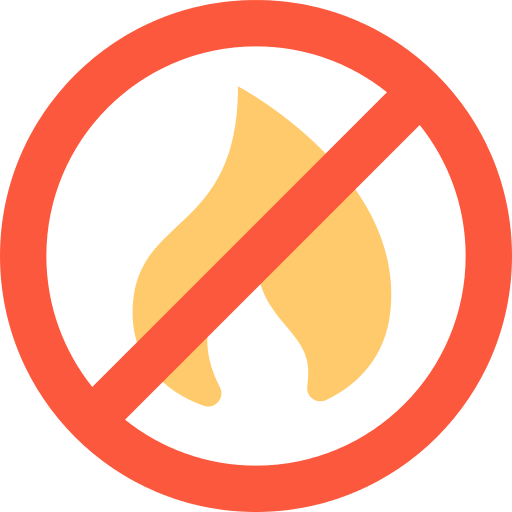- Camping Tips
- Hiking Tips
- RV Camping
- Destinations
- Blog
- Gear Reviews
In this practical camping rules guide, we are going to cover the following:
And much much more ...

More than 40 million Americans go camping every year. As with every large group, rules have to be put in place to promote a conducive environment for co-existence of all.
With pertinence to camping, these rules have been put in place so that every camper's experience may be gratifying.
Some of the rules are unwritten and come from experience while others are well stipulated by each campground. With the latter, it is your responsibility as a camper to inquire about any rules beforehand to avoid any troubles.
Both seasoned and novice campers will have an enjoyable and peaceful stay if they willingly follow these rules.
When camping at a campground, the fundamental rule is to respect the set rules. Some campgrounds are specific about the maximum number of people allowed per campsite or even the number of pets allowed.
With regards to your stay at the campground, be sure to:

It might seem like common sense but setting up camp isn't second nature to everyone.
There are areas in campgrounds that have been set aside for the sole purpose of building camp sites. Where established, do not try to alter these sites and create sites of your own. Simply set up your tent and go about your business.
When there are no designated areas for camping, for instance in the backcountry, then you are free to choose where to set camp.
In such cases, you best have knowledge of how to choose the ideal camping spot. For instance, you should chose a flat area and avoid too much proximity to water sources.
Most campgrounds have speed limits to manage drivers within the site. More importantly, they are set to promote the safety of residents within.
Campgrounds are public areas set for recreation and are therefore filled with children playing or riding bikes and people walking their dogs.
It is imperative that these limits are obeyed as exceeding them can mean life or death for you and fellow campers. Other than endangering lives, you may also end up kicking up dust against other campers. That; dear camper, is just absolutely rude.
Just keep it slow and you'll be good to go.
One of the main reasons why people go camping is to get ample quiet time away from the hustle and bustle of the city.
Ironically, noise is usually one of the biggest complaints from campers. As such, as a responsible camper you should:

As a civilized human being sharing space with others, the reasonable thing to do is to acknowledge their presence and be thoughtful about your actions.
You should therefore always keep noise at a minimum unless you are out in the forest, during which it is advisable to make noises to keep wild animals at bay.
While playing music is not prohibited, you should practice your own enjoyment without imposing on others. There's a good chance your neighbors may be non-music lovers. That, or they simply may not have the same taste as you in music.
Furthermore, while you might be out there with friends, you need to consider that some have their kids with them.
In the same manner, you should also be thoughtful when carrying out your early morning activities so that you do not interfere with campers who intend to start their day much later.
If you are mindful of your behavior then your neighbors will only reiterate.
If you are staying at a campground, the designated quiet hours usually run from 10p.m to 6a.m. During this period, most campers want to sleep in order to be well rested for the next days' activities.
Quiet hours may however differ with each campsite. It is therefore your responsibility to verify with your campsite.
As a responsible camper, you ought to be aware of your noise levels when talking or laughing way into the night. Voices usually carry as tents do not have the ability to contain noises so refrain from raising your voice.
Additionally, noise from electronics be it a radio or a television should not emit beyond the restrictions of your campsite. Remember that you are sharing space with others so be sure to keep the volume to a minimum.
Alternatively, you may leave the electronics at home and choose to enjoy the serenity that camping offers.
As for early risers, pack up as much as you can the night before to avoid and waking people with your noise the next morning.
Some campgrounds forbid the use of generators while others permit usage with set conditions. Needless to say, generators are usually obnoxiously loud and interfere with the tranquility.
Where allowed, noise-producing machines such as a generator are required to be turned off during quiet hours. Instead, they should only run during the posted generator hours.
Even when they allowed, they are usually loud enough to be heard five campsites over. A good alternative would be using solar panels in their place.
Fire is one of the biggest camping hazards that makes both campers and non-campers wary. Much like in any other public area, fire should be handled with caution in campgrounds.

Before arming yourself with campfire supplies, you should enquire in advance to find out if a fire ban is in effect at your campground of choice.
Although campfires are one of the biggest delights of camping, it is strongly advised to follow any fire restrictions. These restrictions are usually set to protect you and the environment at large from wildfires.
A good example of prime time for fire restrictions is in extreme drought conditions where the risk of a wildfire is high.
According to the Fire and Aviation Management division of the U.S National Park Service, about 90% of wild land fires in national parks are a result of human activities. The activities range from unsupervised campfires to discarded lit cigarettes, burning trash in campfires and arson.
Because of this, if a fire ban has been put in place you should make no attempt at building a camp fire. You never know how the turnout will be. Such an act, rather than merely providing you with warmth, may end up wiping out the entire forest if things go out of hand.
If you are however unsure about any restrictions, then pack a camping stove as a good back-up. Your cooking needs will be met by this gear.
Note that during periods of extreme fire risk, fire permits may also be required before building maintaining or use of fires is allowed. Be sure to obtain one where needed.
Where permitted, campfires should be built in contained areas such as the provided fire rings and pits. The purpose of these rings is to contain the flames and reduce wildfire risk.
Do not attempt to make new fire rings. Just take advantage of the existing ones to keep the fire contained. Not only should the fire be small but also supervised at all times.
If camping at a national park, with no designated fire rings, there are guidelines on how to appropriately build a campfire that ought to be followed.
For instance, be sure to build a thick platform for the fire and ensure that the area is clear of any debris and away from low-hanging branches before building it. More importantly, ensure that your fire is surrounded by rocks as there is a high risk that the fire may otherwise escalate.
Leaving camp? Put your fire out. Retiring for the night? Put your fire out. Heading out for the day? PUT OUT YOUR FIRE.
The reason why this rule is emphasized by every campground is because leaving your fire unattended endangers you, those around you and the environment at large.
It is easy to get caught up in the undertakings of camping and forget that your artificial source of warmth is equally hazardous.
You should therefore see to it that your fire remains supervised at all times. If no adult is around the campfire, put it out and while you are at it, ensure that it is completely extinguished. The basic rule for extinguishing is "… if it's too hot to touch, it's too hot to leave."
That goes for smokers as well. Be sure that the cigarette butt is completely out before retiring for the night. A fire could easily emerge and ruin your trip altogether.
While practicing fire safety be sure to also not bring candles or stoves into the tent. Other than accidental fires, there is also another stealthy killer known as carbon-monoxide poisoning.
As your stay prolongs, your trash will continue to accumulate. Burning trash in the campfire is not advised as plastic bags and foil emit toxic smoke into air, land and water leading to pollution of the environment.
You and other campers will inevitably inhale or consume carcinogens (cancer-causing substances) such as cadmium, benzene and styrene which pose a threat to your health.
Not only is the activity not environment-friendly but it also ruins the aesthetic of the site. Burning trash in the campfire is entirely messy as more often than not there will be left-over debris. The next visitors will definitely not be pleased to find half burned beer cans in the fire ring a site that they have paid for.
Furthermore, traces of garbage may attract unwanted visitors such as bears. To avoid this, pack out what you pack in and leave the campfire to cooking and providing warmth.
One of the cores of camping etiquette is the practice of good neighborliness. Only when you respect your neighbors' rights will they respect yours.
Ultimately, your experience will be much more rewarding if your behavior is accommodating of your neighbors.

When camping at a campground, it is mandatory to respect other people's privacy. Just like you, your neighbors are there to seek quiet and relaxation away from the commotion of the city.
The most unspoken camping rule is to stick to your allotted space and avoid crossing through your neighbor's personal space especially without their authorization.
It is simply uncouth to cut through other camper's campsite to save a few minutes getting to places beyond. Even if you have to get to the facilities, the polite means is going around their space as opposed to going through.
Think about it this way, "would you mind your neighbors cutting through your backyard at home?" If your answer is in the affirmative, then you should expect that that is the case with a majority of campers as the site is their temporary property.
The rule is simple; if the campsite is occupied you best stay off of it.
You should always keep a respectful distance from other campers such that your belongings are not outside of your allotted space. Big as your tent may be do not assume that your neighbor's whose tent may be smaller will not mind you taking up their space.
Again; just like you, they have paid to have their own personal space. Therefore when setting camp, ensure that both you and your neighbors can go about your businesses privately.
To put it simply, don't be a nuisance to your neighbors.
Noise and lights should be kept at a minimum, especially at night.
Be sensitive enough to turn the lights off so that they are not glaring at others throughout the night. Lights disturb sleep for some people. Therefore, as common courtesy, keep them off and opt for a flashlight instead.
If you happen to arrive at night and especially after quiet hours, attempt to make your entry stealthy. That means, keeping lights and noise as low as possible. To aid this, unpack the essentials and leave the rest for the next day instead of keeping your neighbors up with glaring lights and loud conversation.
It is not fair for other campers to have their peace disturbed when they have created a conducive environment for you.
When camping with kids, it is important to know that parents and guardians are accountable for their children at all times.
It is therefore the responsibility of respective guardians to know the rules that govern camping with kids and to go a step further to ensure that their kids are aware of the camping rules.

Go over the campground's rules with them and make them understand that they are for their own good. Some of the common rules pertaining kids include fire safety rules, minimizing noise unless in the wild, respecting campsite boundaries and staying together.
The rule of two's is the fundamental rule of camping with kids. Regardless of where they are headed, reinforce that kids should do so in groups of two.
Staying together minimizes their risk of danger and getting hurt. This is because, in case of danger or hurt, one of them can call for aid.
Kids have to learn and understand the difference between common areas such as the amphitheater and private sites so that they don't wander into other people's campsites.
You should not only coach your kids to respect other campers but to respect nature as well such that they do not pluck wild fruits or poisonous plants. Teach them how to identify these hazardous plants and make them understand why it is important to conform to rules pertaining them.
Again, when camping with kids you should be aware of what to do to minimize their noise. A good way is to keep them occupied with both educative and entertaining activities such as a scavenger hunt to prevent the chance of them running off and being a nuisance to your neighbors.
Furthermore, playgrounds are designated for all noisy games to enhance a conducive environment for all campers.
Kids are always at risk of causing fires as they may see fire as a sort of a game rather than a threat. As aforementioned, if using a campfire, an adult should be present at all times to prevent kids from playing with the fire and causing unnecessary fires.
Be sure to reinforce these, and more rules with seriousness so that your kids are aware of how vital it is to follow these rules.
Pets usually enhance the camping experience for pet-lovers, as they too are considered part of the family.
However, they are not always welcome in campgrounds. It is thus upon you as a camper to scout for a campground that is accepting of your additional family member and ensure that its stay does not interfere with that of other campers.
Even when welcome, you still ought to inquire about the pet policy as rules regarding pets differ from campground to campground. Other than requiring vaccination and official documentation, most campgrounds concur on the following:

Before setting off with your pooch, you ought to be aware of any areas where they are not permitted
Although your pets have been invited, they are not always welcome in areas such as bathrooms that are set aside for human sanitation. You definitely do not want to pay that fine when your dog wanders off into unwanted land. Or worse yet, get kicked out of the campgrounds.
It might come as a surprise to you but not all humans are pet lovers. As such, your campsite neighbors will most definitely not approve of you washing your dog where they too will be showering.
Where your dog has been welcomed, most campgrounds will press that they be kept on a leash for safety purposes.
Your pet should not wander off and cause disturbance to neighbors. Therefore, be sure to keep even the friendliest of dogs on a leash.
Other than being an irritation to some campers, your pet could endanger itself by wandering off into poisonous plants or wild animals. Therefore this law is put in place to safeguard your pet too.
In the same way, do not leave your pet unattended even if it is tied to a leash. It may be sensitive to unexpected noises such as those from thunderstorms or vulnerable to attacks from wild animals when it is tied and defenseless.
Noise rules still apply to pets. No noise from excessive barking is allowed, especially at night. If you have to bring their favorite toys or wear them out with exercise before night time then do so to avoid causing unnecessary noise for other campers.
If you can't control your pets with voice command or if they are not trained then you best leave them at home.
Proper disposal of waste if one of the fundamental rules of camping with dogs. Your pet's waste is your responsibility.
Dog litter in a public environment is usually frowned upon. Therefore ensure that you clean up after them be it at camp or on trails.
While you are still on that camping etiquette, ensure that your dog does not go to the bathroom on someone else's site. This is a practice of good neighborliness. If they happen to do so, ensure that you pick up after them. This simple practice may encourage campsites to be more accepting of pets.
Failure to abide by these laws may result in a fee penalty or immediate evacuation.
People set out to camp so as to be able to commune with nature. Arguably one of the most important rules of camping is thus to be mindful of the environment and not to disturb flora and fauna.

Practice eco-friendliness by acquiring firewood from dead trees. You should not seek firewood from standing trees nor should you break branches for roasting sticks.
Cheap as it may be, don't bring your own firewood. Where open fires are allowed, most campgrounds will have firewood for sale.
Take advantage of that to avoid bringing in foreign species that may be contaminated and can spread diseases and pests threatening the forest and undermining any conservation efforts.
If they are not on sale, buy local firewood at local stores or gas stations.
Do not pick or try to eat wildflowers as this may threaten your health. Picking and moving wild fruits is equally as detrimental as moving firewood, thus, you should leave what you find including any attractive rocks and plants as they belong in the wild.
Refrain from curving your names into trees, in the name of leaving a mark, as well. This ruins the aura of the place. Leave it as you found it so your successors can have an equal rewarding experience.
When setting camp, don't dig trenches or hang hammock without the proper authorization. If you have to, be sure to fill them in.
Lastly, do not disturb the land by creating new trails. Stick to the existing ones.
These acts will guarantee that you will still have a forest to enjoy in the years to come.
Being respectful to wildlife and their habitat goes a long way.
One of the means of practicing this respect is by not fishing in places you are not allowed to fish. Akin to hunting, these activities go with seasons. Thus, if a restriction on fishing has been put in place, it is definitely for the balance of the ecosystem.
In the same manner, make no attempt at feeding or touching wild animals. As tempting as it may be to pet wild animals, refrain from doing so as you may scare them and trigger a hostile reaction from them.
Feeding wild animals encourages them to keep coming back for more and they may eventually turn vicious. Even the harmless-looking ones may release their claws therefore getting too close puts you at harm's way.
Be mindful of litter as well. You should not litter food, wrappers and containers as they are harmful to animals. Wild animals may eat the plastic bag before it decomposes. This may in turn be harmful to their health.
Food should not be stored in the tent as the smell will more likely than not attract wild animals such as bears and mountain lions.
Even if it is wrapped, because of the strong sense of smell that bears have, their nostrils can still smell food from afar. Wild animals can hurt humans when in search of food therefore proper storage is necessary.
Instead, secure the food in air-tight containers, built to conceal the smell and then store it in your car overnight.
If boating using a boat that has been moved from one water body to the other. Be sure to clean it using non-toxic bio-degradable cleaner before immersing it in water… this act is good for the eco-system as there could be zebra mussels and bacteria underneath the boat.
When choosing an area for relief, avoid doing so near water sources. Instead, dig a six-eight inch hole, go about your business and cover the area with dirt. The area should be at least 50 meters away from water to avoid contaminating the water supply.
Take the toilet rolls with you as well instead burying them as TP does not biodegrade quickly.
Your experience will only be enhanced if you have a clean site. Maintain cleanliness during your stay and be sure to leave the spot just as spotless as you found it.

You should keep the communal kitchen clean at all times.
Remember when we mentioned bathrooms being built solely for human sanitation? Yes, that also means that the bathrooms are for your bodies and not dishes. As with every shared space, cleanliness is mandatory for the promotion of good health.
Washing your dishes in the bathroom apart from taking up bathroom space that is already compact to begin with, is also unsanitary. Dirty dishes should not be cleaned in the same sink where your face and hands are cleaned. Furthermore, bathroom sinks are not designed to handle food waste.
To promote hygiene and good neighborliness, you should instead do the dishes in your site then dispose the grey water in the provided drains or spread it over a large surface area.
It really doesn't get any simpler than this. Just ‘leave no trace' as you leave your site. Leave as little trace of your existence as is possible to not only protect but also preserve the environment.
The next crew should have no evidence that you were even there to begin with.

The best way to keep animals at bay is to practice cleanliness. If there are no dirty dishes, leftovers or litter to attract wild animals then sighting them near your site will be almost impossible.
Dispose of trash appropriately in bins that are designated for this task. If they happen to be full, pack the trash and leave with your trash rather than disposing it in the fire pit.
Practicing ‘Leave No Trace' ethics entails taking out what you bring in. hence, you should use trash bags for storage of trash to avoid littering the site. If possible, leave the site cleaner than you found it. If you do so, fellow campers will follow suit.
The basic rule is to return everything you may have relocated to its original position when leaving camp. To avoid moving items such as logs when backpacking, bring camp chairs. Not only are they comfortable but this also does not interfere with the forest.
If you happened to have moved the picnic tables, be sure to put them back in place. Notify the staff of any broken parts as well so repairs can be done. It would be unfair for the next camp group to find unfit resources yet you were welcomed with perfectly functioning resources.
Remember that more often than not, violation of the rules set up by campgrounds usually prompts a fee. Conforming to them is thus in your best interest.
Due to the large number of participants that camping attracts, there are a lot of rules that guide the activity.
The pressing question is thus "why should you go through the hassle of participating an activity that is as demanding as camping is in terms of rules?"
Well, it's because the experience will be much more rewarding. You will get to among other things, bond with your family and relax during your stay.
Camping is definitely one of the most educative, enjoyable and rewarding outdoor activities. Following these rules will promise you the benefits rather than repercussions of camping.
Happy camping!